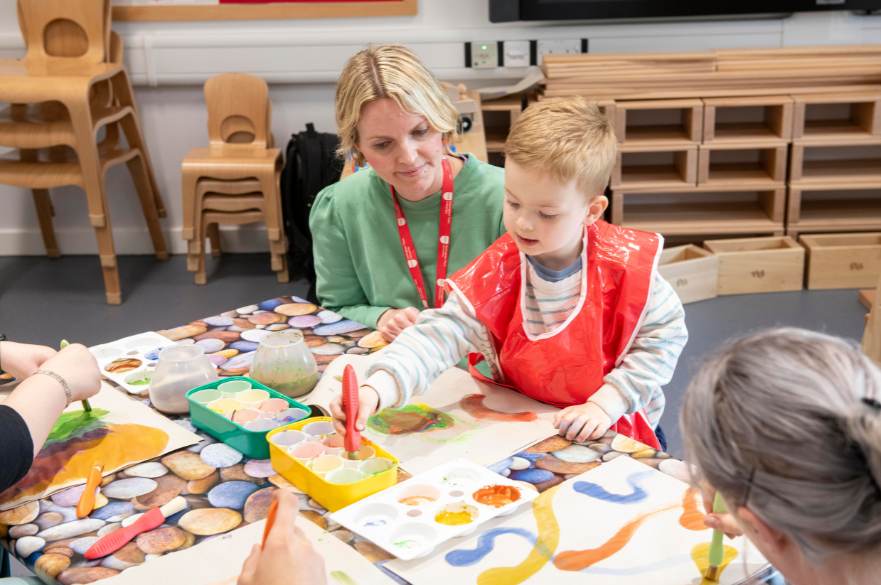Beat the Clearing queue
About this course
Designed with a strong emphasis on employer engagement and work readiness, the Higher National Diploma (HND) Early Years Professional Leadership for England course reflects the increasing demand for highly qualified practitioners working in the Early Years Sector.
Studying with NTU at Mansfield, you’ll enhance your knowledge, skills and behaviours to improve the quality of learning and development in your setting. You’ll become a proactive and influential Early Years practitioner – advocating play-based learning and supporting others to develop your own practice.
The HND Early Years Professional Leadership for England course is designed for those working or aspiring to work with and caring for children from 0–5 years, with knowledge of 5–8 years. The course is suitable for those already working in, or aspiring to work in Early Years childcare, with responsibility for leading other practitioners or groups who hold a Level 3 qualification in Early Years.
-
NTU in Mansfield is your alternative route into higher education. We've built this qualification with the local job market in mind. Each of our higher education courses is relevant, hands-on and work-focused.
-
An assessed practice element in this qualification is recognised by the Department for Education (DfE), allowing students in England to count in the staff: child Level 3 ratios.
-
Benefit from top-class teaching and respected research at an award-winning university.
-
Learn in our state-of-the-art Early Childhood Simulation Suite throughout your studies.
What you’ll study
In year one, you'll undertake stimulating learning required by all early childhood practitioners in the Level 4 Higher National Certificate (HNC). In year two, you'll build on this through the Level 5 Higher National Diploma (HND) with specialist modules relating to the leadership and management pathway.
Course accreditation

Personal and Professional Development through Reflective Practice (15 credit points)
- This module focusses on reflective practice and theory.
- You’ll be encouraged to employ critical reflection to explore your own practice and how this shapes your leaderful approach to early childhood care and education.
Protecting Children in Early Education and Care Environments (15 credit points)
- This module explores contemporary and historic legislation, policies and practices which focus on keeping children safe.
- You’ll be encouraged to reflect upon your own safeguarding practices.
Play and Learning in Early Childhood (15 credit points)
- This module explores the value of play as a pedagogical approach to development, learning and teaching.
Supporting and Promoting Children's Development (Infants and Toddlers) (15 credit points)
- This module explores a range of theoretical perspectives in relation to early child development.
- You’ll focus on the initial stages of physical, intellectual, and emotional development as well as exploring early language acquisition and the development of social skills.
Supporting and Promoting Children's Development (Young Children) (15 credit points)
- This module considers attitudes towards child development and critically explores the internal and extraneous factors that might influence their developmental progress.
- You’ll focus on children in the later stages of the early years phase.
Promoting Healthy Living (15 credit points)
- This module examines a range of contemporary health issues exploring this on the stage of personal practice, local, national and international concerns.
Preparing for Research (15 credit points)
- This module prepares students to use active research to improve the early childhood sector.
- You’ll explore a range of required research skills and develop a personal research preparation project.
Promoting Inclusive Early Education and Care Environments (15 credit points)
- This module examines the importance of inclusion and inclusive practice.
- You’ll be encouraged to reflect upon what this looks like in practice and how it can be further promoted through policy, practice and pedagogical approach.
Investigating Childhood: Action Research for early Childhood Practitioners (30 credit points)
- This module examines what is meant by action research and what it entails.
- You’ll develop an action research project in your own setting, which will focus on enacting change at a policy or practice level.
Improving Quality in Early Education and Care Environments (15 credit points)
- This module explores quality from a range of perspectives encouraging you to critically reflect on your role and the role of others in impacting quality.
- You’ll develop a critical awareness of how quality information is used to improve practice.
- You’ll acquire the skills necessary to critically consider the unnecessary influences on quality within policy and practice development.
Current and Emerging Pedagogies in Early Childhood Education and Care (15 credit points)
- This module explores the history of ECEC pedagogy from local and international perspectives.
- You’ll consider the impact of pioneers in the field and their ongoing contribution to contemporary practice.
- You’ll be encouraged to examine how pedagogical theories positively contribute to contemporary practice and what limitations you might be in following these theoretical perspectives.
- You’ll explore the idea of curriculum critically considering what it is, why it is relevant and the ways in which such approaches might restrict or limit practice.
Advanced Practice in Safeguarding and Child Protection for the Early Childhood Practitioner (15 credit points)
- This module explores three main aspects of child protection.
- You’ll examine the role of the practitioner in dealing with child protection, the process required and the how to deal with disclosures.
- You'll demonstrate how you support current practice in your own setting, lead practice and address the challenges faced when using locally policies systems and practices supporting children in your care.
- You’ll examine and demonstrate how a practitioner operates holistically using multi-agency approaches and how to facilitate this for a child-centred outcome.
Managing and Leading People in Children’s Early Education and Care Environments (15 credit points)
- This module is concerned with developing students understanding between leadership and management as well as the methods these are applied through in early years settings.
- You’ll examine the knowledge gained to develop appropriate activities to lead and manage a team in an ECCE environment.
Managing Children’s Early Education and Care Environments (15 credit points)
- In this module you’ll consider the nature and purpose of curriculum with a focus on how management implements the curriculum in meeting the individual needs of children.
- You’ll consider how to manage staff resources effectively to ensure high quality provision.
Mentoring and Supervision in Early Childhood Education and Care Practice (15 credit points)
- This module supports students in understanding mentoring and supervision as a means of establishing learner relationships that allow individuals to take control of their own professional development.
- You’ll also develop confidence and motivation through the consolidation of reflective practice to drive your own personal and professional development.
We regularly review and update our course content based on student and employer feedback, ensuring that all of our courses remain current and relevant. This may result in changes to module content or module availability in future years.
How you're taught
The course will be delivered over two and a half days per week.
Total Qualification Time
The Total Qualification Time on the HNC is 1,200 hours and 2,400 hours on the HND. Total Qualification Time is an estimate of the total amount of time expected of a student to achieve the award. This includes guided learning when a tutor is present to give specific guidance, directed learning which is unsupervised and independent and invigilated assessment.
Total Qualification Time includes:
- guided learning which can include live taught online sessions as well as opportunities for face-to-face delivery, one to one tutorial
- regular meetings with your work-based tutor
- independent and unsupervised research/learning – which may include engagement with asynchronous (taught online) video content
- mandatory placements
- unsupervised compilation of a portfolio of work experience
- unsupervised e-learning
- unsupervised e-assessment
- unsupervised coursework
- watching a pre-recorded podcast or webinar
- unsupervised work-based learning.
Guided Learning
Guided Learning on the HNC is 480 hours and 960 hours on the HND. Guided Learning is defined as the time when a tutor is present to give specific guidance towards the learning aim being studied on a programme.
Guided Learning includes:
- classroom-based learning supervised by a tutor
- work-based learning supervised by a tutor
- mandatory placements
- live webinar or telephone tutorial with a tutor in real time
- e-learning supervised by a tutor in real time
- all forms of assessment which take place under the immediate guidance or supervision of a tutor or other appropriate provider of education or training, including where the assessment is competence-based and may be turned into a learning opportunity.
Placement
Students will complete a total of 525 placement hours throughout the course - 375 hours at level 4 and an additional 150 hours at level 5.
Mandatory elements:
- A minimum of two different settings is required
- A minimum of 75 practice hours with each of the following age ranges:
- From birth to one year 11 months
- From two years to four years 11 months
- Five years to seven years 11 months
- If a student undertakes work placement in two settings only, at least one of these settings must enable the student to meet the practice hours requirements for at least two of the age ranges specified above.
How you're assessed
Students will be assessed throughout the two years as per the assessment requirements for the HND units – the assessments will include all of those listed.
- written reports
- essays
- creation of planning documents
- work-based projects and portfolios
- academic posters, displays, leaflets
- PowerPoint (or similar) presentations
- recordings of interviews/role plays
- work placement logbooks and reflective journals
- workplace observation of practice and assessment records
- presentations with assessor questioning
- professional discussion.
There will be an Early Childhood simulation suite to facilitate practice and learning where you can:
- replace and amplify real experiences with guided ones
- practice as many times as you need
- build confidence
- lose inhibitions
- respond to scenarios.
Careers and employability
The course offers an introduction to Early Childhood, Education and Care, as well as equipping you with the skills, knowledge, behaviours and experience relevant to the workplace or placement. You will be prepared for a career in a number of different settings in the early years education, leadership and care sector, including:
- Assistant Manager
- Baby Room Leader
- Health Play Specialist
- Deputy Leader
- Higher Level Teaching and Learning Assistant
- Early Years Coordinator
- Hospital Play Worker
- Early Years Foundation Stage Lead
- Pre-School Leader
- Early Years Officer
- Play Leader
- Early Years Practitioner
- Senior Practitioner/Key Worker
- Early Years Support Worker
- Room Leader
- Specialist Practitioner in Child Development (Health)
- Community Nursery Nurse.
Campus and facilities
As an NTU Mansfield student, you’ll benefit from the latest facilities and modern technology to support your studies and help you get the most out of student life.
We are continually investing in our facilities and enhancing our learning and teaching environment to make it an inspiring place for students.
Plus, as an Early Childhood student at NTU in Mansfield, you'll learn in our state-of-the-art Early Childhood Simulation Suite throughout your studies.
Facilities and services include:
- University Centre
- Early Childhood Simulation Suite
- Teaching and Learning Centre
- Library
- Dedicated study zones, including PC suites
- On-site café
- Social spaces
- Sports facilities
- Student Support Services
- Nottingham Trent Students Union (NTSU) drop-in events.
Entry requirements
UK students
Standard offer: 64 UCAS Tariff points from three A levels or equivalent
Other requirements: GCSE English and Maths grade C / 4; or Equivalent qualifications such as Functional Skills Level 2, Enhanced Disclosure and Barring Service (DBS) check.
To find out what qualifications have tariff points, please use our tariff calculator.
Additional requirements for UK students
- Other related Level 3 qualifications
- Relevant work experience, or an international equivalent to the above qualifications.
Contextual offers
If you don’t quite meet our entry requirements, we might be able to make you a lower offer based on a range of factors, including your background (such as where you live and the school or college you attended), your experiences and your individual circumstances (you may have been in care, for example). This is called a contextual offer, and we get data from UCAS to help make these decisions. We do this because we believe everyone with the potential to succeed at NTU should have the opportunity to do so, no matter what barriers you may face.
Other qualifications and experience
NTU welcomes applications from students with non-standard qualifications and learning backgrounds, either for year one entry or for advanced standing beyond the start of a course into year 2 or beyond.
We consider study and/or credit achieved from a similar course at another institution (otherwise known as credit transfer), vocational and professional qualifications, and broader work or life experience.
Our Recognition of Prior Learning and Credit Transfer Policy outlines the process and options available for this route. If you wish to apply via Recognition of Prior Learning, please contact the central Admissions and Enquiries Team who will be able to support you through the process.
Getting in touch
If you need more help or information, get in touch through our enquiry form.
International students
This course is not suitable for tier 4 visa applicants.
We accept qualifications from schools, colleges and universities all over the world for entry onto our undergraduate and postgraduate degrees. If you’re not sure how your international qualification matches our course requirements please visit our international qualifications page.
Additional requirements for international students
There are no additional requirements for this course.
English language requirements
View our English language requirements for all courses, including alternative English language tests and country qualifications accepted by the University.
If you need help achieving the language requirements, we offer a Pre-Sessional English for Academic Purposes course on our City campus which is an intensive preparation course for academic study at NTU.
Other qualifications and experience
If you have the right level of qualifications, you may be able to start your Bachelors degree at NTU in year 2 or year 3. This is called ‘advanced standing’ entry and is decided on a case-by case basis after our assessment of your qualifications and experience.
You can view our Recognition of Prior Learning and Credit Transfer Policy which outlines the process and options available, such as recognising experiential learning and credit transfer.
Sign up for emails
Sign up to receive regular emails from the International Office. You'll hear about our news, scholarships and any upcoming events in your country with our expert regional teams.
Getting in touch
If you need advice about studying at NTU as an international student or how to apply, our international webpages are a great place to start. If you have any questions about your study options, your international qualifications, experience, grades or other results, please get in touch through our enquiry form. Our international teams are highly experienced in answering queries from students all over the world.
Policies
We strive to make our admissions procedures as fair and clear as possible. To find out more about how we make offers, visit our admissions policies page.







